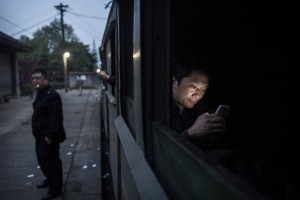China Cracks Down on News Reports Spread via Social Media
The New York Times, 6 July 2016
By Edward Wong and Vanessa Piao – What do the subjects of these Chinese news reports have in common?
■ The decay of moral standards in villages in northeastern China.
■ Arson on a bus in Changsha, the capital of Hunan Province.
■ A girl from Shanghai flees from a Lunar New Year dinner at her boyfriend’s family home in the south because of appalling living conditions.
The powerful Cyberspace Administration of China, whose mission is to censor online information and block some websites (including that of The New York Times), has judged all those reports to be based on false information spread through social media platforms.
The reports were cited in an agency announcement posted on Sunday as examples justifying a new regulation. The agency said it would punish websites that publish “directly as news reports unverified content found on online platforms such as social media.”
“It is strictly forbidden for websites not to specify or to falsify news sources and to use hearsay to create news or use conjecture and imagination to distort the facts,” the Cyberspace Administration said.
The agency said it had already warned and punished nine websites, among them the popular news sites of Sina, Ifeng, Tencent, Caijing and 163.
The agency’s announcement could be interpreted as a government mandate requiring Chinese news organizations and online publishers to adhere to stricter standards of journalism and truthful reporting.
But scholars of the Chinese news media say this is another attempt by the government of President Xi Jinping to tighten the vise around the practice of journalism and to restrict the flow of information online.
David Bandurski, the editor of the China Media Project website at the University of Hong Kong, pointed out that the agency’s demand in the first line of the announcement — that “various websites adhere to correct guidance of public opinion” — clearly signals that published news must conform to political norms, rather than to any objective standard of the truth.
“It means political control of the media to ensure regime stability,” Mr. Bandurski said in an interview. “There is nothing at all ambiguous about the language, and it means we have to understand that ‘fake news’ will be stopped on political grounds, even if it is patently true and professionally verifiable. This overarching fact negates any real meaning this C.A.C. notice might have in terms of truly curbing the very real problem of sensationalism and corruption in China’s media.”
He added: “We might ask whether it is meaningful at all to talk about ‘truth,’ ‘rumor’ or ‘fake news’ in a system where journalists are told by the state that their primary role is to ‘emphasize positive news.’ So there is a fundamental conflict between the propaganda role of the media, on which Xi Jinping has been far more insistent than his predecessors, and the demand that they be truthful.”
Qiao Mu, an associate professor of journalism at Beijing Foreign Studies University, said that although the statement was directed at news websites, its ultimate aim was to try to silence ordinary people who post news on social media platforms like WeChat or Weibo. This is how many Chinese learn of events around the country.
“The statement is more about intimidating every internet user because they are hard to control,” he said.
Under Mr. Xi, the Chinese government has said it will not hesitate to punish internet users for spreading online rumors — which often means news or analysis that Communist Party officials find objectionable.
In August 2015, the Ministry of Public Security said it had punished nearly 200 people for “spreading rumors” online. Among these were posts about the stock market turbulence last summer.
In February, Mr. Xi visited the headquarters of three main Communist Party and state news organizations and delivered a major speech saying that all news media must work for the party. This inspired unease among many liberal Chinese, including Ren Zhiqiang, an outspoken property tycoon and party member who had a big social media presence.
After he criticized Mr. Xi’s speech on his microblog account, which had nearly 38 million followers, the Cyberspace Administration deleted the account and publicly scolded Mr. Ren.
In April, Mr. Xi gave a speech at a forum on cybersecurity and information in which he called for officials to “realize rich positive energy” online and to control public discourse. And on June 21, the cyberspace agency began a broad campaign to “purify” user comments online, including ones deemed to endanger national security or jeopardize social stability.
The guidelines aimed at limiting the spread of information from social media are the first major announcement from the Cyberspace Administration under its new director, Xu Lin. Mr. Xu was deputy director of the administration before being promoted last week. Mr. Xu worked directly under Mr. Xi when Mr. Xi served for a brief period as Shanghai party chief.
The former head of the cyberspace agency, Lu Wei, was an outspoken official who often traveled overseas, sometimes with Mr. Xi, and lectured the heads of foreign technology companies.
He promoted the idea of “internet sovereignty,” saying each country has the right to exert whatever control it wants over access to cyberspace.
http://www.nytimes.com/2016/07/06/world/asia/china-internet-social-media.html?ref=world


